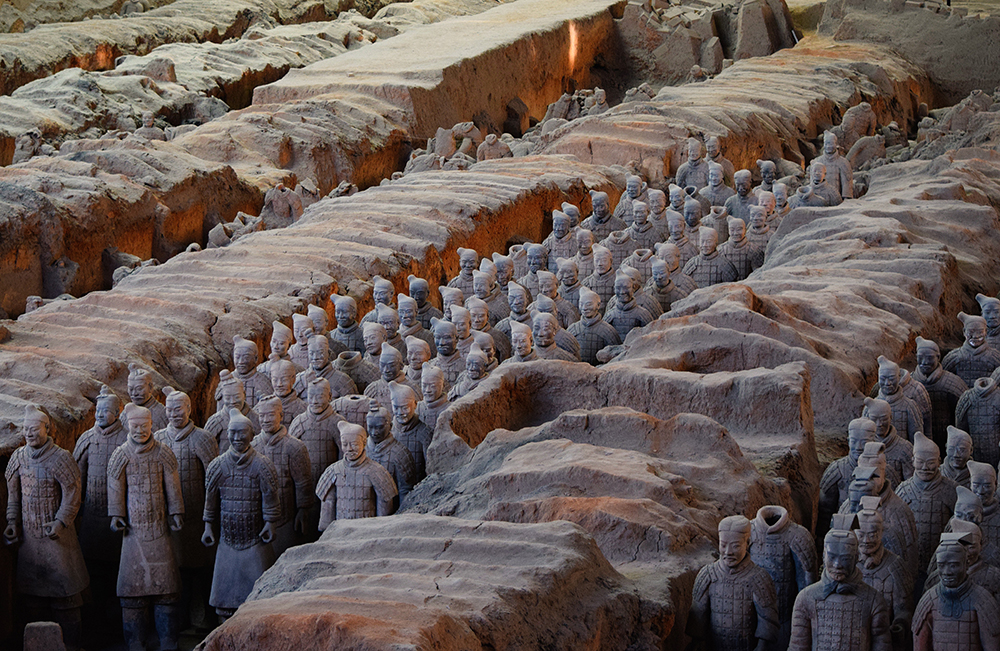
President Donald Trump continued to cast doubt on whether or not November’s election could be “honest,” again questioning the legitimacy of mail-in ballots. The remarks come a day after he refused to commit to a peaceful transfer of power. (Sept. 24)
AP Domestic
WASHINGTON By Election Night of 1876, Democratic presidential candidate Samuel Tilden was just one electoral vote away from victory. But returns from four states that could still hand the presidency to his Republican opponent, Rutherford B. Hayes, were in question.
Both candidates declared victory, and the dispute dragged on for months. Threats of a civil war loomed. Voter fraud and intimidation ran rampant. Congress was forced to create an electoral commission that would decide the presidency. Voting along party lines, it declared Hayes the winner by just one electoral vote.
By the time the country finally had a president, inauguration was just two days away.
“It was a violent time,” said Franita Tolson, an election law expert from the University of Southern California.
More than 140 years later, the looming chaos of the 2020 presidential race harkens back to the ugliest, most antagonistic presidential election in U.S. history.
A caravan of supporters for Democratic presidential nominee Joe Biden drive past supporters of President Donald Trump standing on the sidewalk on October 18, 2020 in Miami, Florida.
(Photo: Joe Raedle, Getty Images)
A tsunami of litigation over election rules is already underway, and analysts expect more in November, as disputes over the legitimacy of mail-in ballots continue to rise. A global pandemic that has killed more than 220,000 people has prompted a record number of Americans to vote by mail, creating at least two nightmare scenarios: Thousands of ballots could be rejected for various technical reasons, such as allegedly mismatched signatures, and an anxious country may have to wait weeks for the election results.
Stoking the anxiety and deep political divisions is the incumbent candidate himself. Lagging behind Democratic presidential candidate Joe Biden, President Donald Trump has relentlessly claimed that massive voter fraud involving mail-in ballots is underway and has made clear he expects a conservative-leaning Supreme Court, with three of his appointed justices, to intervene in a disputed election.
Foreign interference: DNI John Ratcliffe says Iran, Russia interfering in presidential election
An abnormal election year: More than 1 million people could lose their vote
Much of what might happen depends on how tight the race is.
“If the election is not very close, then I don’t think the election is going to get a lot of litigation,” said Rick Hansen, an election law expert from the University of California Irvine.
But if it’s close, Hansen said, expect a kind of “trench warfare” in several states.
The worst-case scenario, Tolson said, is violence in November as the country waits for days, if not weeks, for the election results. In an era polarized politics and high-stakes election, a losing partys refusal to acquiesce, although legally meaningless, could lead to civil unrest, she said.
Law enforcement agencies prepare: Foiled kidnapping of Michigan governor highlights fears of election-related conflict
What history has shown us about contested elections and peaceful transitions of power.
USA TODAY
Already, law enforcement agencies have sounded the alarm.
Threats of anti-government sentiment, civil unrest and disinformation “will begin to converge with the presidential election in November in a manner not previously experienced by our nation,” Jared Maples, chief of New Jersey’s Homeland Security Preparedness office warned last month.
The best course for the country is to accept that election results will be delayed and to let the process play out, said Penn State Harrisburg public policy professor Daniel Mallinson.
“There’s nothing we can do about the president and his rhetoric,” he said. “We need to cultivate this norm that we very well may not know who the president is on Election Night, and that’s OK.”
2020 could be worse than 2000
The tense recount in Florida in 2000, when the Supreme Court ultimately decided the close race between President George W. Bush and Al Gore, has recently found its way back to national headlines, as pundits and political writers tried to find a modern-day comparison to the looming chaos of the 2020 presidential election.
Texas Gov. George W. Bush greets Vice President Al Gore at Washington University in St. Louis on Oct. 17, 2000.
(Photo: LAURA RAUCH, Associated Press)
But comparing the two is difficult, and 2020 depending on how close the race is in critical battleground states could be worse and will put the country’s archaic election infrastructure to the test, experts say.
“2000 is unusual because people felt like the Supreme Court decided the election. It is possible that the Supreme Court could weigh in on some of the election results in certain states that ultimately end up deciding the (2020) election. It is comparable in that sense,” Tolson said.
For the Supreme Court to be involved in deciding the next presidential election, it would have to be so close a difference of only a few thousand ballots in swing states, Hansen said.
“The odds of that happening is small,” Hansen said, but added it should still be a concern.
The issues on the ground are also different.
In 2000, tensions didn’t begin until after Election Day, when it became clear that the race was too close to call in Florida, Hansen said. The 2020 presidential race is facing dueling controversies that are already underway and could stretch for days, if not weeks, after Nov. 3.
Transfer of power
The 2020 candidates are also very different from Gore and Bush.
Whether Trump will accept the result of the election if he loses is a question hanging over the ongoing controversies and looming legal disputes.
After repeatedly refusing to commit to a peaceful transfer of power, Trump said during a townhall last week that he will accept the results if he is defeated. But the president continued to raise doubts about the election process, claiming that “thousands of ballots” have been dumped.
Questions about denouncing white supremacy came up again for President Trump at an NBC town hall.
USA TODAY
While there have been instances of dumping ballots, the incidents are far from the scale or the massive conspiracy the president suggests.
In early October, the Justice Department accused a New Jersey mail carrier of discarding nearly 2,000 pieces of mail, including 99 general election ballots. In September, the Justice Department announced an inquiry into nine discarded mail-in ballots in Pennsylvania.
Aside from claims of voter fraud, fears over voter suppression have centered on mailboxes.
In California, a ballot box was set ablaze this weekend, and fire officials are investigating whether the act was an attempt to disenfranchise voters. Republicans in the state had also placed unofficial ballot drop boxes at certain places, injecting further confusion into the issue. Democrats decried it as an attempt to confuse voters, and that state officials said it could be illegal.
‘We’ll protect their right to vote’: How election officials are preparing for voter intimidation tactics
Civil rights experts point to long wait times to vote as a sign of growing voter suppression in the U.S. Here’s what to expect in the 2020 election.
USA TODAY
What top law enforcement leaders are saying
Although Attorney General William Barr testified before the House in July that he had “no reason” to believe the election would be “rigged,” as Trump has said, Barr has more recently echoed the president’s claims that voting by mail is “very open to fraud and coercion” and likened it to “playing with fire.”
Recently, the Justice Department changed its longstanding policy aimed at discouraging election interference, with new guidance giving prosecutors more authority to take action on voter fraud allegations even as voting is underway.
Matt Lloyd, spokesman for the Justice Department’s Criminal Division, said earlier this month that the guidance was part of communication that is “routinely” sent via email to federal prosecutors during election season.
“No political appointee had any role in directing, preparing or sending this email,” Lloyd said.
Attorney General William Barr and FBI Director Christopher Wray in Detroit on Dec. 18, 2019.
(Photo: Bill Pugliano/Getty Images)
Meanwhile, FBI Director Christopher Wray sought to tamp down concerns over voter fraud by telling a congressional committee last month that authorities had “not seen, historically, any kind of coordinated national voter fraud effort in a major election, whether it’s by mail or otherwise.”
Despite the president’s claims of a “rigged” election, Wray and intelligence officials reaffirmed their confidence in the U.S. election system. Officials said it would be difficult to manipulate voting results on a massive scale, although they said foreign adversaries are continuing to spread disinformation to sow chaos in the electoral process.
Foreign interference: Feds investigating scam emails threatening voters if they don’t vote for Trump
‘The fight will be in Pennsylvania’
Hundreds of local, state and federal lawsuits are already underway in several states.
But perhaps no other state will be more closely watched than Pennsylvania, experts say. It’s a battleground state that Trump won narrowly by only 44,000 votes or 0.7% in 2016. Several polls show Biden leading in the Keystone State.
Pennsylvania has been at the center of multiple litigations, one of which reached the Supreme Court. On Monday, the high court allowed Pennsylvania to count ballots received up to three days after Election Day, a major defeat for Republicans who have sought to limit mail-in voting in the state. The ruling could have an impact in several other states, including Michigan, North Carolina, Wisconsin and Minnesota, where the deadline for mail-in ballots has been the subject of court battles.
In Pennsylvania, “there’s potential for a lot of chaos” if the race is as close as it was in 2016, said Mallinson.
“Pennsylvania is in a place where we’re still getting used to mail-in balloting in the midst of this high-stakes election,” Mallinson said. “Like Florida in 2000, the fight will be in Pennsylvania.”
The battle in Pennsylvania: Trump barely won here in 2016. His 2020 election may depend on keeping this swing state.
Democrats hope to win in swing state Pennsylvania and rural towns like Wilkes Barre in Luzerne County.
NorthJersey.com
‘Naked’ ballots
One likely source of chaos on Election Day is the state’s new and convoluted mail-in voting system that requires voters to place their ballots inside a secrecy envelope before putting them inside the return envelope may be too convoluting for many voters. In the presidential primary in June, hundreds of voters neglected to put their ballots inside the secrecy envelopes. Some counties, like Philadelphia, accepted the so-called “naked ballots,” while others rejected them.
In September, the Pennsylvania Supreme Court decided that “naked ballots” will not be counted, causing an alarm among election officials over the possibility that thousands of votes will not be counted in one of the most consequential battleground states.
The decision prompted Democrats to launch digital ads educating voters on how to vote by mail in Pennsylvania.
“Will that be enough?” Mallinson said. “Anytime you have rules in place that make voting more complicated, you raise the potential of disenfranchising people. Are people in this case disenfranchising themselves?”
Lisa Deeley, chairwoman of the Philadelphia city commissioners, shared a similar sentiment in a September letter urging state lawmakers to eliminate the requirement for secrecy envelopes. With a higher-than-usual number of voters voting by mail for the first time in November, Deeley predicted that as many as 100,000 votes statewide could be rejected “all because of a minor technicality.”
“It is the naked ballot ruling that is going to cause electoral chaos,” Deeley, a Democrat, wrote.
Election in Pennsylvania: Judge throws out Trump campaign lawsuit over Pennsylvania poll-watching law and mail-in ballots
Significant delays likely in key swing states
Because of a record number of mail-in ballots, swing states such as Michigan, Iowa and New Hampshire changed state laws to allow local election workers to start pre-processing mail-in ballots that is, opening and sorting them and verifying signatures either the day before or a few days before Election Day. In North Carolina, Florida and Ohio, pre-processing of ballots have already started.
Pennsylvania and Wisconsin have yet to heed calls from local election workers to give them a head start. In Pennsylvania, pre-processing ballots does not start until 7 a.m. on Nov. 3, raising the likelihood of significant delays in tallying election results.
State Democrats and Republicans both agree that local election workers should be allowed to pre-process ballots early. But negotiations have remained on a standstill as party leaders sparred over how much of a head start to give election workers.
Gov. Tom Wolf and Democrats wanted as many as 21 days now a moot point with just a little over two weeks left before the election. Republicans proposed three days, which Democrats rejected because the bill would have also banned drop boxes.
“In counties like Philadelphia, it’s going to take a lot of time just to open the ballots,” Mallinson said. “As Americans, we’ve gotten used to knowing who the winner is on Election Night. There’s a lot of pressure on Pennsylvania to have a clear count as soon as possible.”
Contributing: Kevin Johnson and Richard Wolf
Read or Share this story: https://www.usatoday.com/story/news/politics/elections/2020/10/22/a-lot-chaos-trump-rhetoric-covid-lawsuits-complicate-election/3643521001/





More Stories
As the pandemic wreaks havoc on TV and movie ‘love lives’, intimacy coordinators need to find ways to adapt